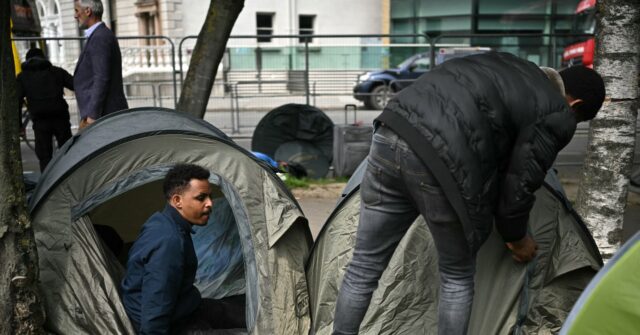The Irish government’s expedited plans to establish a migrant encampment for 1,000 asylum seekers near Athlone faced significant legal and community backlash, ultimately leading to their abandonment. Local councillor Paul Hogan initiated a legal challenge against the government, focusing on the environmental implications and logistical issues of housing such a large number of male migrants in a temporary encampment consisting of 150 tents. In a recent hearing, the High Court was informed that the government had conceded to the case presented by Hogan, highlighting the local tensions surrounding the proposed camp and the government’s failure to properly assess its environmental impact.
Hogan, a member of the centre-right Independent Ireland party, presented his arguments against the left-leaning government’s plans from a perspective emphasizing community welfare and safety. He contended that the government neglected to conduct adequate environmental assessments and raised concerns about potential traffic hazards posed by the free movement of migrants around the encampment. Hogan expressed fears that the influx of 1,000 men into a town with a population of around 22,000 could strain local health services, which are already grappling with issues such as overcrowded schools and lengthy wait times for medical services.
The backlash from the local community was swift and vehement following the government’s announcement in October. Residents expressed their discontent through fundraisers to support Hogan’s legal challenge, organized town hall meetings, and staged protests against the camp. Concerns articulated by community members included distrust in the government’s ability to vet the migrants and a fear that the large number of single men would disrupt the social fabric of the town. Such sentiments were echoed in a local demonstration where residents emphasized that their concerns were rooted in community safety rather than racial bias, a narrative that reflects the broader anxieties many communities across Ireland feel about migration.
Hogan’s affidavit to the High Court illustrated a lack of communication between local authorities and the Department of Integration prior to the decision to establish the encampment. This neglect for community input sparked outrage among locals, who felt sidelined in decision-making processes that would significantly impact their lives. Local officials, including Fianna Fáil councillor Aengus O’Rourke, vocalized their disapproval of the government’s approach, asserting that it disregards democratic principles and community involvement. O’Rourke emphasized that the legal case should serve as a wake-up call for the government to engage more thoughtfully with local communities on such critical matters.
In the context of these events, the Independent Ireland party has articulated broader concerns within its manifesto that speaks to the increasing challenges faced by the country in terms of public health infrastructure and immigration control. The party asserts that illegal immigration is detrimental to industries such as tourism, which historically have been vital to the Irish economy. The party’s position resonates with a segment of the Irish population that feels overwhelmed by the challenges posed by rising migration numbers, and it reflects a tension between the drive for humanitarian responses to immigration and the imperative to safeguard local resources and community well-being.
Overall, the legal challenge against the proposed encampment reflects a microcosm of the broader societal conversations occurring in Ireland regarding immigration, community trust in government, and the sustainability of public services. The outcome signals not only the importance of local involvement in governance but also the challenges that come with managing the complexities of asylum-seeking and integration within existing communities. The government’s response to this situation will likely shape the future of immigration policy and community relations in Ireland, emphasizing the need for transparent dialogue and equitable solutions that honor both humanitarian obligations and community stability.

